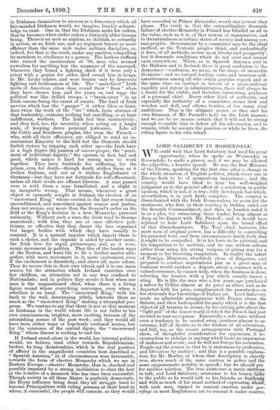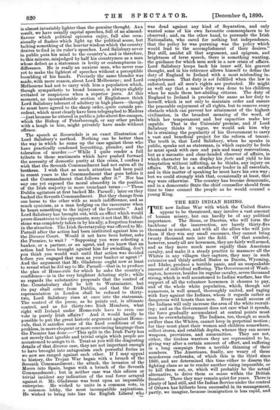LORD SALISBURY IN ROSSENDALE.
WE could wish that Lord Salisbury had used his great opportunity, when he spoke on Wednesday in Rossendale, to make a graver, and, if we may be allowed the adjective, a heavier speech. He was the first Minister of the Crown, speaking for the first time after a change in the whole situation of English politics, which every one in Europe feels to be of momentous importance ; and the country would have liked to hear his well-weighed judgment as to the general effect of a revolution in public opinion, which is not, it is true, fully developed, but which, nevertheless, is in part fairly complete. The country is disenchanted with the Irish Home-rulers, its scorn for the mutineers, who first, in their meeting in Dublin, ruled out the Seventh Commandment, and then in London ruled it in as a plea for ostracising their leader, being almost as deep as its disgust with Mr. Parnell ; and it would have rejoiced to hear Lord Salisbury upon the broad effect of that disenchantment. The Tory chief, however, like most men of original power, has a difficulty in controlling his personal bent, and from circumstances rarely feels that it ought to be controlled. It is his forte to be satirical, and his temptation to be sardonic, and he can seldom refrain either from using his strong weapon, or giving way for a moment to his besetting temptation. In reality the safest of Foreign Ministers, absolutely clean of Jingoism, and prepared to conduct negotiations just as a great man of business would conduct a dispute about a contract with a valued customer, he cannot help, when the business is done, relieving the tension with a jest which usually leaves a sting. He is like the man who a few years ago purchased a salver by Cellini almost at its price as silver, and as he departed with his prize, complimented the pawnbroker on his obviously fine knowledge of Italian art. Lord Salisbury made an admirable arrangement with France about the Sahara, and then half-spoiled the amity which it is the first object of all treaties to secure, by his cutting gibe about the "light soil" of the desert world in which the French had just secured so vast an expanse. Essentially a safe man, without even a tendency to be carried away, cautious almost to an extreme, full of doubts as to the wisdom of all adventure, and full, too, as the recent arrangements with Portugal show, of thoughtful consideration for opponents, it re- creates him to indulge in sayings which leave an impression of rashness and scorn ; and he will not forego his recreation. People say the reason is, that he is statesman by profession, and litterateur by instinct ; and that is a possible explaiia;- tion, for Mr. Morley, of whom that description is exactly true, shows much of the same caution in policy and' he same epigrammatic acridity in speech ; but we shouldire fer another solution. The true aristocrat is rarely catrthis in talk, and Lord Salisbury, aristocrat to his boned;..tallris to the public as he would talk to his friends, as fearrespbr and with as much of his usual method of expression; with such men, trained to conceal emotion under per- siflage as most Englishmen are to conceal it under reserve, is almost invariably lighter than the genuine thought. As a result, we have usually capital speeches, full of an almond- flavour which political epicures enjoy, full also occa- sionally of flashes which light up the political scene, but lacking something of the heavier wisdom which the country desires to find in its ruler's speeches. Lord Salisbury never in public puts his mind to the country's, and is therefore, to this minute, misjudged by half his countrymen as a man whose defect as a statesman is levity or contemptuous in- difference. He is really an anxious man, who never rose yet to make the lightest of speeches without a perceptible trembling of his hands. Precisely the same blunder was made, with more reason, about Lord Melbourne ; and Lord Melbourne had not to carry with him a population which, though sympathetic to broad humour, is always slightly irritated or suspicious when a superior jeers. At this moment, no inconsiderable section of Englishmen think Lord Salisbury tolerant of adultery in high places—though he must have agreed to the sharp order, quite outside pre- cedent, which must clearly have been telegraphed to Madras —just because he uttered in public a joke about fire-escapes, which the Bishop of Peterborough, or any other prelate with a laugh in him, might privately have made without offence.
The speech at Rossendale is an exact illustration of Lord Salisbury's method. Nothing can be better than the way in which he sums up the case against those who have practically condoned boycotting, plunder, and the toleration of murder :—" While I quite render a full tribute to those sentiments which have pushed. forward the necessity of domestic purity at this crisis, I confess I wish that the Seventh Commandment had not eaten all its brethren. I wish that as much attention had been paid in recent years to the Commandment that goes before it and the Commandment that follows after it." Nor has any one yet exposed the moral absurdity in the position of .the Irish majority in more trenchant terms :—" These Dublin agitators at first backed Mr. Parnell ; later on they backed the Seventh Commandment. But they change from one horse to the other with as much indifference, and as much cynicism, as a man hedging on the racecourse when he hears something to the injury of the favourite." And Lord Salisbury has brought out, with an effect which would prove disastrous to his opponents, were it not that Mr. Glad- stone was completely taken in by his ally, a forgotten feature in the situation. The Irish Secretaryship was offered to Mr. Parnell after the action had been instituted against him in the Divorce Court. Would it not have been better, asks the Premier, to wait ? " Supposing you were selecting a banker, or a partner, or an agent, and you knew that an action had been brought against him for swindling, don't you think you would wait until that action was decided before you engaged that man as your banker or agent :" And the argument that Mr. Gladstone ought now at least to reveal what he did say to Mr. Parnell—that is, to produce the plan of Home-rule for which he asks the country's confidence—is in the very brightest debating style ; while as .regards the substantive proposals that the control of the..•Constabulary shall be left to Westminster, but its• pay shall come from Dublin, and that the Irish representation in London shall be reduced to thirty- two, Lord Salisbury rises at once into the statesman. The control of the purse, as he points out, is ultimate control; and as for thirty-two Irish Members, what right will Ireland under Home-rule have to even one `vote in purely Irish affairs P And it would hardly be possible to put the great historic argument against Home- rule, that it satisfies none of the fixed conditions of the problem, in more eloquent or more convincing language than the-Premier has done :—" This split in the Irish Party has not merely that ignoble and trivial origin which people are accustomed to assign to it. Treat as you will the disgusting details of that divorce case, they are not important enough to have brought into antagonism such powerful furies as we now see ranged against each other. If I may appeal to history, the Trojan War began with a breach of the Seventh Commandment; the attack, the invasion of the Moors into Spain, began with a breach of the Seventh Commandment ; but in neither case was this odious or trivial incident any indication of the real force arrayed against it. Mr. Gladstone was bent upon an impossible enterprise. He wished to unite in a common vote, in a common lobby, the most incompatible aspirations. He wished to bring into line the English Liberal who was dead against any kind of Separation, and only wanted some of his own favourite commonplaces to be observed ; and, on the other hand, to persuade the Irish Nationalists, who cared for nothing but independence, that the policy he was pursuing was the policy which would lead to the accomplishment of their desires." But still, amidst all that argument, and epigram, and brightness of terse speech, there is something wanting, the guidance for which men seek in a new crisis of affairs. Lord Salisbury keeps back his inner self, his gravest thought, and in his reticence allows himself to define the duty of England to Ireland with a most misleading in- completeness. That duty is not fulfilled when the law is enforced, and all men's rights are protected. He might as well say that a man's duty was done to his children when he made them law-abiding citizens. The duty of England. to Ireland is precisely the same as her duty to herself, which is not only to maintain order and ensure the peaceable enjoyment of all rights, but to remove every obstacle which can prevent her attainment of the highest civilisation, in the broadest meaning of the word, of which her temperament and her capacities make her capable. That is the Unionists' promise, and if Lord Salisbury thinks it vague, we would ask him why he is straining the popularity of his Government to carry a vast and beneficial project for the reform of tenure. The truth is, that Lord. Salisbury, when he speaks in public, speaks not as statesman, in which capacity he feels he must speak with care and pain and many reservations, but as a' sarcastic and clear-headed observer of affairs, in which character he can display his forte and yield to his temptation without inflicting, as he thinks, any injury on affairs. Well, he is a satisfactory leader in all essentials, and in this matter of speaking he must have his own way; but we could strongly wish that, occasionally at least, that way were otherwise. The country has become democratic, and in a democratic State the chief counsellor should from time to time counsel the people as he would. counsel a young King.























































 Previous page
Previous page